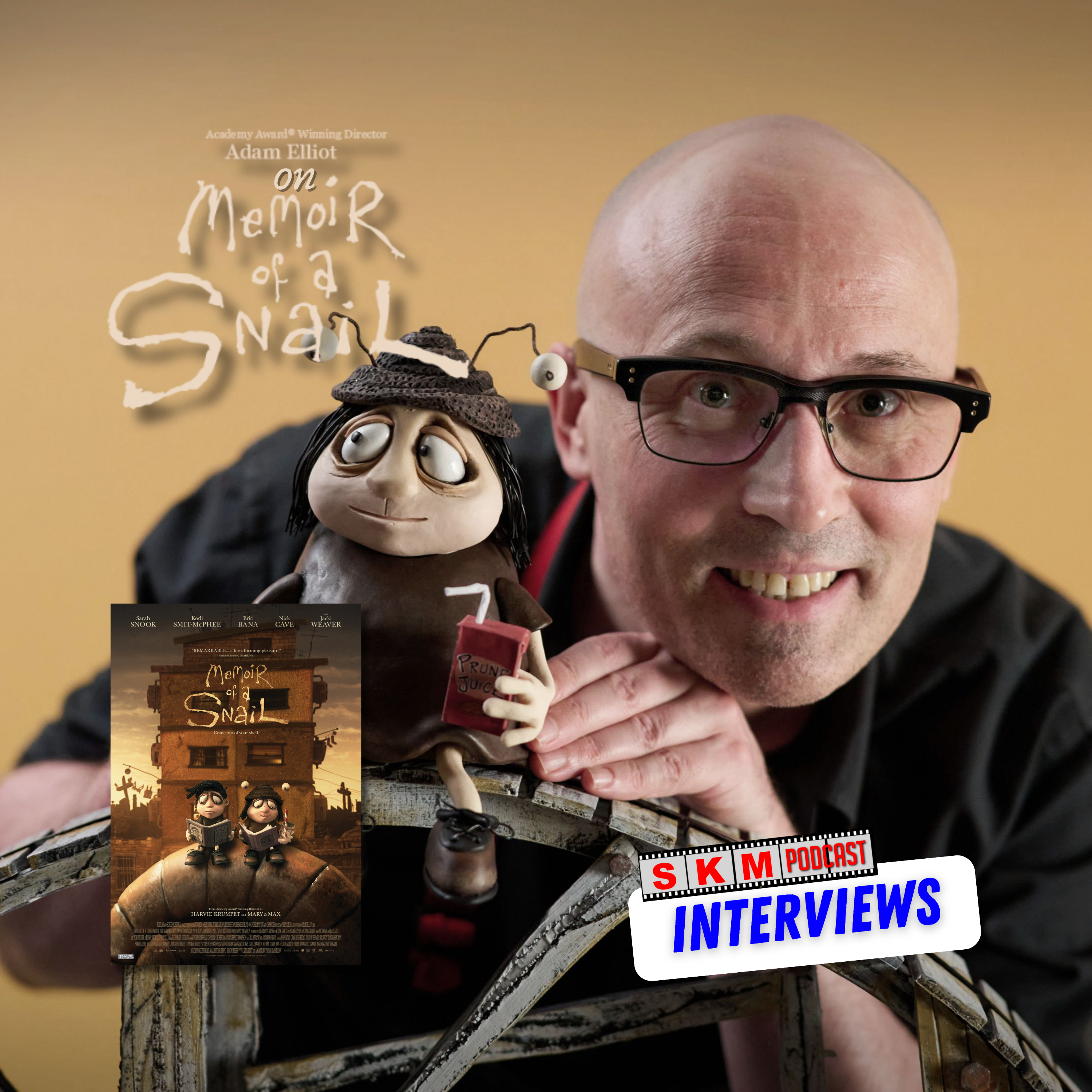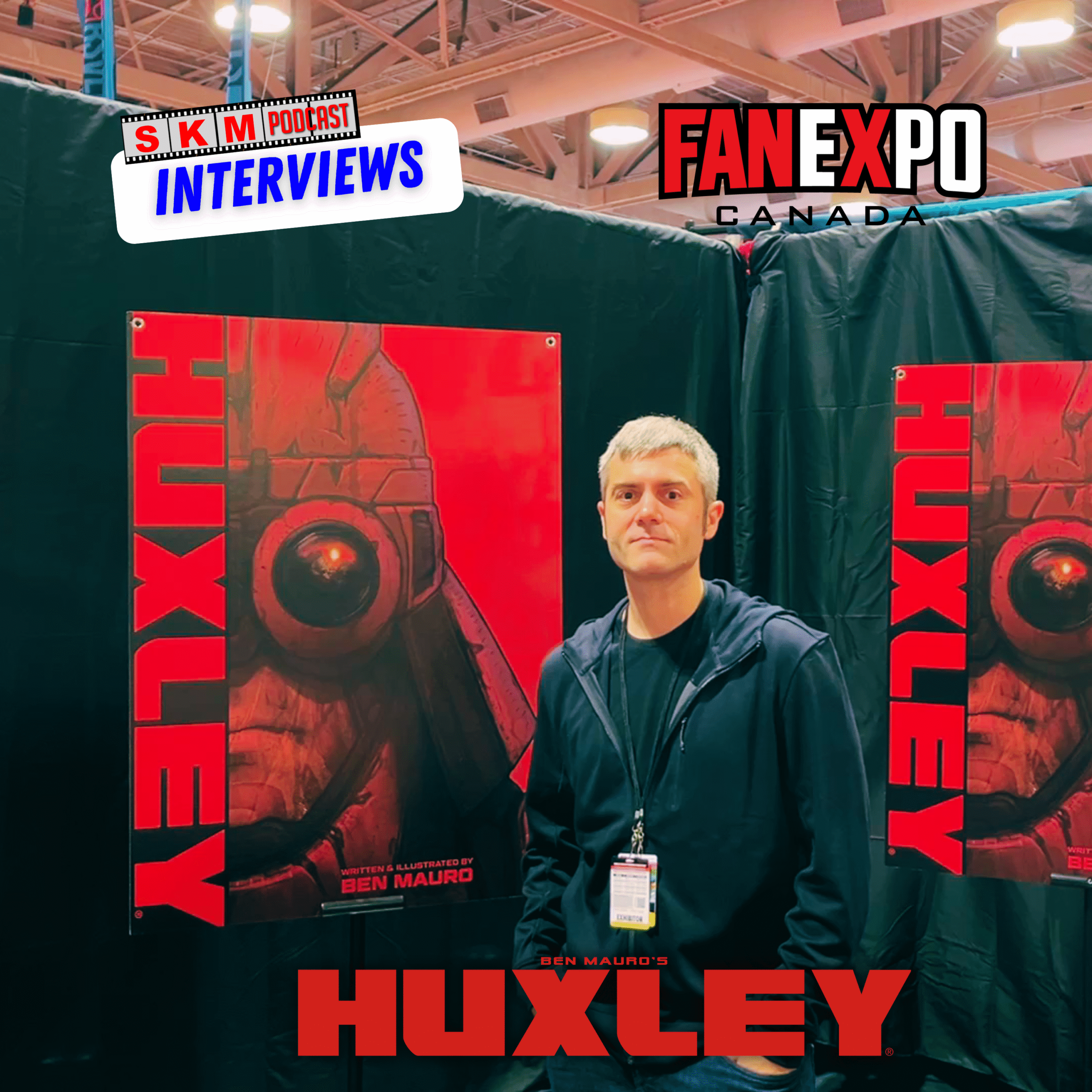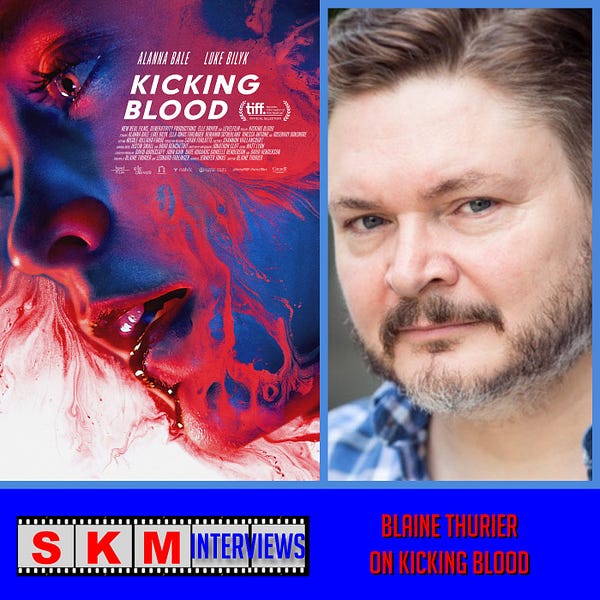Episode Transcript
[00:00:00] Speaker A: Foreign.
[00:00:10] Speaker B: Kelly interviews Jay Draw Coolich, Mallory Drumm and Alex Lee Williams on Eli Roth presents Dream Eater. Like and subscribe for more content like this.
All right, so where did the idea for Dream Eater come from?
[00:00:28] Speaker C: So, you know, it's funny, we originally had an idea for an IP called Asleep, like, stylized asleep. And, you know, it was a straight narrative film, but there was a nugget within that I. Within that IP that had to do with parasomnia, that had to do with this kind of sleepwalking phenomenon. So it was something that we had pitched a few times to studios over the years, and we were never really getting any bites with it.
Excuse me. But it was an idea that we always really believed in and that it was an IP that we always thought, especially that core nugget of an idea of the parasomnia was something that was really interesting to us. So when we decided to go, okay, we're not going to wait now for permission. We're not going to wait to get greenlit to make this film. We're going to sell fun. We went back to our font of ideas, and that was one that always kind of just kept rising to the top.
So we dusted it off, took the nugget out, and then we thought, oh, it'd be perfect for a intimate story about a couple who's, you know, going through some relationship things, as well as this parasomnia that's going to add a lot of pressure and conflict into the relationship. And then, yeah, from there it was just like off to the races, you know, and then, you know, we did a lot of research, and the research really informed how the narrative kind of took shape along with the fact that it was found footage. And then we also felt that it was perfect to kind of just weave our own Lovecraftian kind of lore into it.
[00:01:46] Speaker B: So did you always intend for Dream Eater to be a found footage film?
[00:01:50] Speaker D: Yeah, we always did. You know, when we pitched our first feature, it was a found footage. And then later, as we got to making it, the studio changed it to a narrative. So we always really wanted to go back to explore the found footage aspect. And we thought, just because it's also, you know, this movie is really about a couple, that the found footage nature would be able to kind of provide that intimacy that we really wanted to feel while being a part of Alex and Mallory's relationship.
[00:02:18] Speaker B: Always the challenge of found footage, you have to explain why they are always filming it.
[00:02:23] Speaker D: For sure, Absolutely. Yeah. You know, we've talked about this before. I think some people think that found footage is easy, but that's really hard when you have to justify why the camera is on, why we're filming certain things with where in narrative, you just believe it's like the God's eye view and you can put the camera anywhere.
[00:02:39] Speaker C: So, like.
[00:02:40] Speaker B: So like the backstory of documentary filmmaker.
[00:02:43] Speaker D: Exactly, yes. So our main character, Mallory, is a documentary filmmaker. She's a cinematographer. And what is actually true, based off of the research we did with Parasomnia, is they ask you to record your episode so that the doctors can go back and take a look at what's happening.
So with all of that, we felt like, oh, this is a really cool justification for making our film found footage is that, you know, with our research, like I said, Malorie would be tasked with filming Alex's episodes. And, you know, the fact that she's a documentarian and a cinematographer, it feels almost very natural to her to be doing this as well.
[00:03:20] Speaker C: Yeah, it's like, it's super fun when you're crafting a found footage film because you get. You get to actually weave the cinematography into the narrative and then both start to inform each other. Cinematography informs the narrative and vice versa. So it's really cool. You know, by the time we had our first draft, it was much more a shooting draft than it was a first draft because we had written camera moves and motivations into the script, which is a really fun thing, I think, from the whole pre pro kind of ideating side of it.
[00:03:46] Speaker B: Well, I found that the film is structurally very similar to Paranormal Activity since every scene is, like, labeled with the time code. And when you know that the time code is late at night, you know that something's going to happen.
Totally.
[00:03:59] Speaker D: Absolutely. We know we want to get you in that, like, creepy zone, you know what I mean? And like you said, it kind of sets you up for being like, oh, crap, what's about to happen?
[00:04:08] Speaker C: But Blair Witch was, you know, Blair Witch was a huge, like, structurally, a lot of, you know, I've heard a lot of people say that, you know, Blair Witch doesn't have structure. We personally think otherwise. But, you know, structurally, especially the first half of the movie, we were really paying attention to the cues that Blair Witch followed because that's a movie that moves. That's a movie that really. It hooks you right away. It gets you to know the characters within like 2 minutes and 30 seconds. I think they're already at the supermarket filming the marshmallows. You know, exactly who everyone is, why they're there, what they're doing. And that was something for us that we were like, we want to get right into it, because the thing that we're big fans of is get to your inciting incident early, really get to the idea and the premise of what your film's about as quickly as you can, because you'll hook people in, and you're probably going to keep them for longer. So I'd say also, like, a huge structural inspiration for us was definitely Blair.
[00:04:59] Speaker B: Witch Project, but you had the benefits of being the protagonist and also the directors. Like, Blair Witch had its own directors that had to communicate with the cast through, like, GPS messages and such.
Yeah.
[00:05:11] Speaker A: And us also acting in the movie was something that was born out of necessity. We had some actors in mind, good friends of ours. They were actress. So once we had an actor rep read the script within 10 pages, they were like, oh, this is going to. This is going to cost more than you have. So it was something that we had to very quickly decide, okay, we're going to do it. And honestly, in the end, too, I think it helped with just, like, the DIY nature of the movie. Being the writers, directors, the editors, the producers and the actors, it allowed for us to spend 110% of our time, you know, just on our own figuring it out and making sure that this thing was gonna get done.
[00:05:49] Speaker B: In this one, you kind of like, it's more a Lovecraftian entity. So was that always your idea?
[00:05:55] Speaker D: Yeah. You know, we're really big Lovecraft fans, and then once we decided that we were gonna explore parasomnia and dreams, it felt just like a really cool opportunity to bring in Lovecraft, you know, use him as inspiration, use the kind of the sandbox in which he built and allow us to play in it a little bit and kind of put our own spin on it. So I think, like, from the beginning, Lovecraft was. We always knew we were going to infuse some of that in there.
[00:06:23] Speaker C: Yeah. You know, because to what Mallory's saying, too. Right. It's like, what's cool about Lovecraft is it encourages you to really do your own thing. Right from the beginning of Lovecraft, he was very, like, in terms of collaborating with people and allowing them to play within the mythos. So it's really fun, like you said, to kind of be able to now go and go, okay, cool. We're going to create our own mythology. We're going to create our own kind of set of rules and start to explore some of those unknowns that we want to explore that were kind of, you know, the groundwork was laid in things like the outsider dreams in the witch house, stuff like that.
[00:06:57] Speaker B: Now this is. I don't know if this is coincidental or not, but. So you have the. At one point, the expositional scene in an episode of Unresolved Mysteries, and I don't know if you knew it, but in 1997, there was a TV movie from the files of Unsolved Mysteries, the Sleepwalker Killer.
[00:07:15] Speaker D: Oh, yeah, look it up.
[00:07:20] Speaker B: It actually starts. Hilarious. Swank.
[00:07:23] Speaker D: You know what's so funny? We were literally talking about Hilary Swank today.
[00:07:26] Speaker B: That's so funny.
[00:07:27] Speaker C: Well, because, like, yeah, definitely being like, fans of like, the show itself, right? Because, like, when we were even doing the vo, it was like, okay, cool, let's. Let's channel that. Robert Stack meets, like the Keith Morrison. You know what I mean? Like, yes, no, maybe. But yeah, so that's really cool, man. That's a really cool little factoid.
[00:07:44] Speaker B: How did Eli Roth come to see the film and decide to distribute it?
[00:07:48] Speaker A: So the film had played a couple film festivals. The first one was the HP Lovecraft Film Festival in Portland, Oregon. And then we won best feature Film there.
[00:07:57] Speaker C: Shocked.
[00:07:57] Speaker A: And yeah, it was crazy. Like, there were so many amazing films that were playing there. So we actually were shocked that that happened. And because of that, the unnamed footage fest out of San Francisco reached out because they're a found footage/ POV focused film festival. So they said, we'd love to play your movie. And then right before this was about to happen, they basically were sending out screeners and to influencers and stuff to preview the movies. And we weren't actually on that list because I guess we didn't check that off in our application. And so they were like, oh, yeah, we'll tag it along and we'll send it out if you want. We're like, yeah, please, please. It was like minutes away from happening. And then they sent it out and it went to this influencer named Chuck Shaughnessyourmovieguy412.
And he reviewed the film and it went viral. And like overnight, the video had millions of views, which blew our minds. And then because of that, it started, you know, getting people talking. And then eventually, about a month later, Eli Roth reached out via Instagram and it went into our spam folder in our Instagram feed and we clicked on it. We were like, this can't be real. This cannot be real.
[00:08:57] Speaker C: And he basically said, ellie Roth. Yeah.
[00:09:00] Speaker A: So he asked, do you have distribution? I'd love to see your movie. And we thought best Case scenario, he'll like it, and then we'll just use his quote for the poster, like, best case scenario. And then within the time it took to watch the movie, he said, I want to buy it. And then that was on a Saturday. And by the following Friday, he had the movie, which was the dream come true. One of our idols. So it's absolute dream come true.
[00:09:22] Speaker B: Yeah, I just. I kind of find it funny about you're talking about, like, quotes and such. Just. Just. I saw the trailer the other day watching Next Stalker in the theater, and, like, just, like, I noticed every single quote in the trailer is like, Instagram letterbox.
[00:09:38] Speaker A: Totally.
[00:09:39] Speaker D: Yeah. It's amazing how much social media has just changed the way you do everything. You know what I mean? Including getting your movie seen out there. Yeah, it's wild.
[00:09:49] Speaker B: Kind of makes me feel ancient, being a blogger.
[00:09:53] Speaker C: No, it's like you're part of that, right? Like, it's like, you know, because what's cool is like, you know, we always say it's like the movies that we loved most growing up were the ones that were critically panned, but audiences loved and vibed with, especially the horror audience. So for us, you know, like, seeing those types of grassroots, legitimate reviews of people who vibed with it, you know, for us, it's hugely humbling and one of the most satisfying, I think, things. So, like, yeah, to your point of seeing those quotes, for us, we're just like, we love it. We love seeing that in, like, Letterboxd.
[00:10:22] Speaker B: Top 4 has become, like, pop culture now, for sure.
[00:10:25] Speaker D: Yeah, absolutely.
[00:10:26] Speaker A: It's a dream of mine to be asked what my top four is by a letterboxd. For sure.
[00:10:30] Speaker B: I've seen the letterboxd interviewer film festivals, like, Ask Elijah Wood questions or something.
[00:10:36] Speaker D: Ask me, please.
[00:10:38] Speaker B: Okay, so that's it for my interview for Genie there.
[00:10:42] Speaker D: Thank you.
[00:10:43] Speaker A: Thank you so much, man.
[00:10:44] Speaker D: This was a lot of fun.
And the poster's gonna say, Alex is now attacking. The dream is gonna eat me.
[00:10:50] Speaker E: Sean Kelly on Movies Interviews is part of the SK on Movies podcast network. You can access links to all our shows by going to skonmoviespodcast, ca or search us on Spotify, Apple Podcasts, YouTube, or where else you listen to your podcasts. This has been a production of Sean Kelly on Movies.


